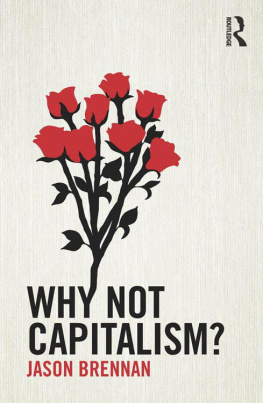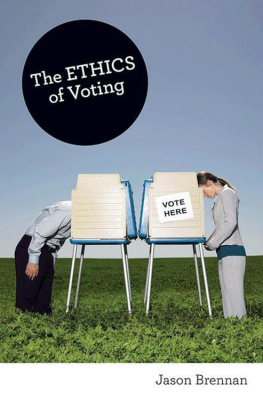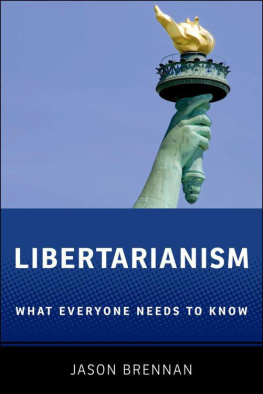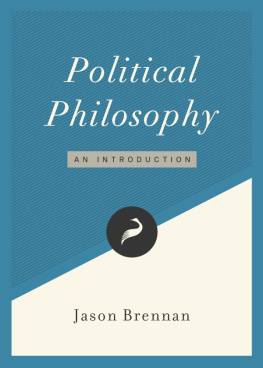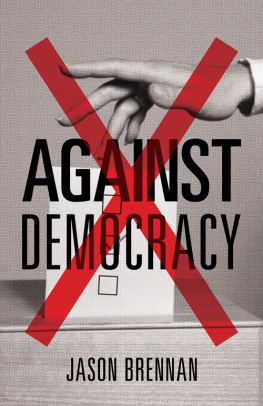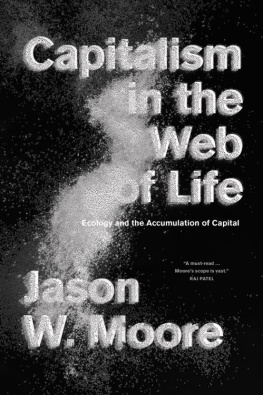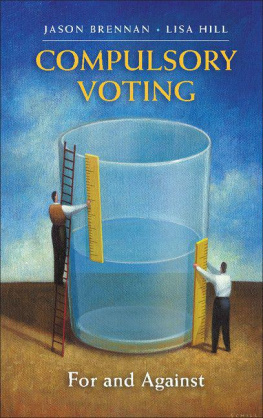Jason Brennan - Why Not Capitalism?
Here you can read online Jason Brennan - Why Not Capitalism? full text of the book (entire story) in english for free. Download pdf and epub, get meaning, cover and reviews about this ebook. year: 2014, publisher: Routledge, genre: Politics. Description of the work, (preface) as well as reviews are available. Best literature library LitArk.com created for fans of good reading and offers a wide selection of genres:
Romance novel
Science fiction
Adventure
Detective
Science
History
Home and family
Prose
Art
Politics
Computer
Non-fiction
Religion
Business
Children
Humor
Choose a favorite category and find really read worthwhile books. Enjoy immersion in the world of imagination, feel the emotions of the characters or learn something new for yourself, make an fascinating discovery.
- Book:Why Not Capitalism?
- Author:
- Publisher:Routledge
- Genre:
- Year:2014
- Rating:5 / 5
- Favourites:Add to favourites
- Your mark:
- 100
- 1
- 2
- 3
- 4
- 5
Why Not Capitalism?: summary, description and annotation
We offer to read an annotation, description, summary or preface (depends on what the author of the book "Why Not Capitalism?" wrote himself). If you haven't found the necessary information about the book — write in the comments, we will try to find it.
Why Not Capitalism? — read online for free the complete book (whole text) full work
Below is the text of the book, divided by pages. System saving the place of the last page read, allows you to conveniently read the book "Why Not Capitalism?" online for free, without having to search again every time where you left off. Put a bookmark, and you can go to the page where you finished reading at any time.
Font size:
Interval:
Bookmark:
Not Capitalism?
Most economists believe capitalism is a compromise with selfish human nature. As Adam Smith put it, It is not from the benevolence of the butcher, the brewer, or the baker, that we expect our dinner, but from their regard to their own interest. Capitalism works better than socialism, according to this thinking, only because we are not kind and generous enough to make socialism work. If we were saints, we would be socialists.
In Why Not Capitalism?, Jason Brennan attacks this widely held belief, arguing that capitalism would remain the best system even if we were morally perfect. Even in an ideal world, private property and free markets would be the best way to promote mutual cooperation, social justice, harmony, and prosperity. Socialists seek to capture the moral high ground by showing that ideal socialism is morally superior to realistic capitalism. But, Brennan responds, ideal capitalism is superior to ideal socialism, and so capitalism beats socialism at every level.
Clearly, engagingly, and at times provocatively written, Why Not Capitalism? will cause readers of all political persuasions to re-evaluate where they stand vis--vis economic priorities and systemsas they exist now and as they might be improved in the future.
Jason Brennan is Assistant Professor of Strategy, Economics, Ethics, and Public Policy at Georgetown University. He is the author of Compulsory Voting: For and Against, with Lisa Hill, Libertarianism: What Everyone Needs to Know, The Ethics of Voting, and A Brief History of Liberty, with David Schmidtz.
JASON BRENNAN
Why
Not Capitalism?

First published 2014
by Routledge
711 Third Avenue, New York, NY 10017
and by Routledge
2 Park Square, Milton Park, Abingdon, Oxon, OX14 4RN
Routledge is an imprint of the Taylor & Francis Group, an informa business
2014 Taylor & Francis
The right of Jason Brennan to be identified as author of this work has been asserted by him in accordance with sections 77 and 78 of the Copyright, Designs and Patents Act 1988.
All rights reserved. No part of this book may be reprinted or reproduced or utilised in any form or by any electronic, mechanical, or other means, now known or hereafter invented, including photocopying and recording, or in any information storage or retrieval system, without permission in writing from the publishers.
Trademark notice: Product or corporate names may be trademarks or registered trademarks, and are used only for identification and explanation without intent to infringe.
Library of Congress Cataloging in Publication Data
A catalog record has been requested for this book.
ISBN: 978-0-415-73296-3 (hbk)
ISBN: 978-0-415-73297-0 (pbk)
ISBN: 978-1-315-84877-8 (ebk)
Typeset in Joanna MT and Din
by RefineCatch Limited, Bungay, Suffolk
My mentor David Schmidtz once said, in conversation, Dont concede the moral high ground. Ive also heard him say that a proper defense of markets has to be in the language of morality, not just the language of economics. This book is written in that spirit.
Thanks to John Tomasi, David Schmidtz, David Estlund, Corey Brettschneider, Sharon Krause, Greg Weinar, Pete Boettke, Loren Lomasky, John Hasnas, Peter Jaworski, Kevin Vallier, Michael Heumer, Bryan Caplan, Thomas Cushman, and James Otteson, with whom Ive had many fruitful conversations about these topics over the years. Thanks twice to John Tomasi for suggesting I turn the Mickey Mouse Clubhouse thought experiment, which I had used simply as a teaching tool, into a short book. Thanks to audiences at the University of Arizona, University of Toronto, University of New Orleans, Bowling Green State University, the American Philosophical Society, Georgetown Universitys Hoyas for Liberty, and students at Brown University, Georgetown University, and Wellesley College for their valuable feedback and criticism. Thanks to Andy Beck at Routledge for his enthusiasm for the project and for his aid in seeing how the argument could go beyond mere parody. Finally, thanks to Keaton and Aiden Brennan, ages 2 and 5, for their research support, upon which this book greatly depends.
Jason Brennan
Few observers are inclined to find fault with capitalism as an engine of production. Criticism usually proceeds either from moral or cultural disapproval of certain features of the capitalist system, or from the short-run vicissitudes (crises and depressions) with which long-run improvement is interspersed.
Encyclopaedia Britannica entry on capitalism
Michael Moore ends his film Capitalism: A Love Story (2009) with a catechism: Capitalism is an evil, and you cannot regulate evil. You have to eliminate it and replace it with something that is good for all people, and that something is democracy. By democracy, Moore means collective control of the means of productionthat is, socialism. Yet, even after spending 127 minutes exposing the evils of capitalism, Moore wont just come out and say that we need to replace capitalism with socialism. Why not?
The term socialism appears on, but is buried deep within, the Occupy Wall Street (OWS) website, despite its repeated invections against the economic status quo and its vague call for a new socio-political and economic alternative. Why?
Moore and the OWS organizers know what many Americans think: that socialism is a dirty word with a dirty history. Many accept a common historical account: In the 20th century, the world experimented with two great social systems. The countries that tried different forms of capitalismthe United States, Denmark, Switzerland, Australia, Japan, Singapore, Hong Kong, and South Koreabecame rich. Consider: The United States puts the poverty line for an American living alone at about $11,500. A person living in the United States off this meager income, adjusting In socialist countries no one got rich, except maybe a few Communist Party officials. Socialism was especially bad for poor proletariat workers, the very people the system was supposed to help the most. So, sure, capitalism has problems, as Michael Moore and OWS can show you, with perhaps some exaggeration here and there. But socialism was a disaster. In short, we had the debate between capitalism and socialism, and capitalism won.
Yet, despite this, many people who oppose socialism and support markets find capitalism morally uninspiring. Sure, capitalism performs better than socialism. But, we worry, that is just because we are so selfish.
Capitalism rewards us for developing greater talent and working in critical jobs. It pays us for innovation and efficiency. We respond to the incentives, and so it works. Socialism asks us to work hard for the sake of others. We refuse, so it doesnt work. But many people worry this just shows we are not altruistic enough for socialism.
In the 20th century, we learned that the great power wielded by socialist governments attracts sociopaths and tyrants. Yet, again, we worry that this is just because we are so morally flawed. Socialism asks us to supply benevolent philosopher-kings, but the best we can come up with is a Stalin, Mao, or Pol Pot. It seems the problem is with us.
Since we are selfish, greedy, and fearful, maybe market-based economies are the best we can do. If only men were angels, however, we could dispense with capitalism and make socialism work. Utopia is socialist.
Even capitalisms greatest defenders seem to agree. Adam Smith tells us, It is not from the benevolence of the butcher, the brewer, or the baker, that we expect our dinner, but from their regard to their own interest. We address ourselves, not to their humanity but to their self-love.
Font size:
Interval:
Bookmark:
Similar books «Why Not Capitalism?»
Look at similar books to Why Not Capitalism?. We have selected literature similar in name and meaning in the hope of providing readers with more options to find new, interesting, not yet read works.
Discussion, reviews of the book Why Not Capitalism? and just readers' own opinions. Leave your comments, write what you think about the work, its meaning or the main characters. Specify what exactly you liked and what you didn't like, and why you think so.

